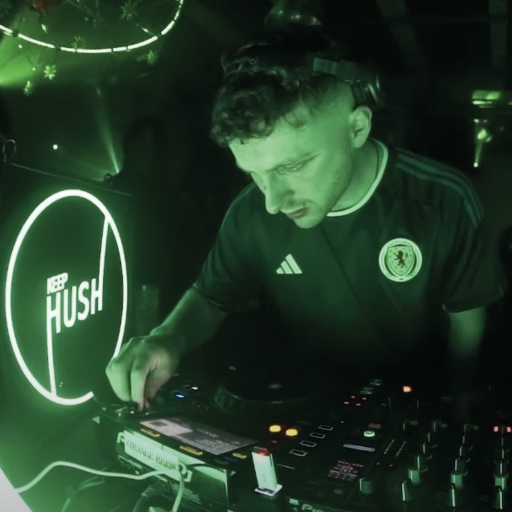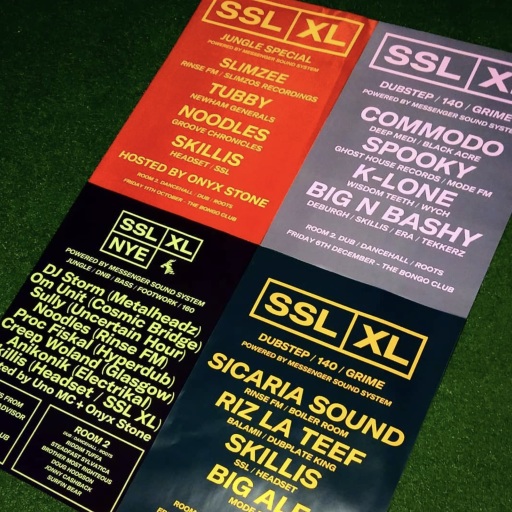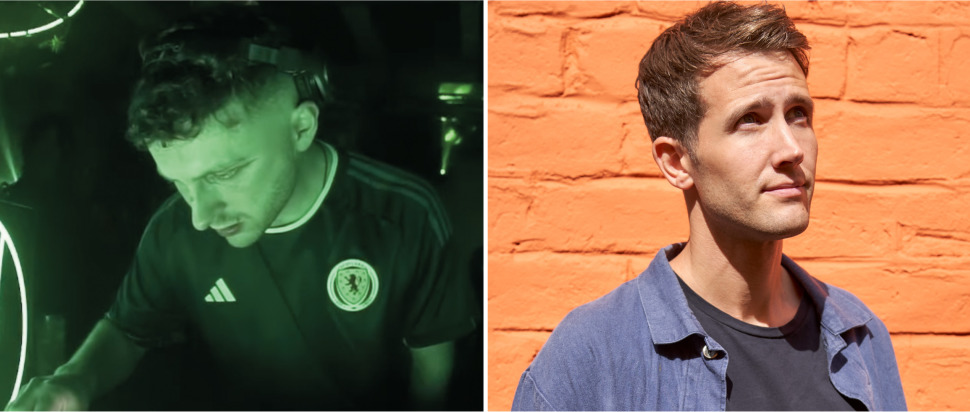Numbers & Headset on the art of throwing a party
Numbers and Headset discuss decades worth of past experiences in unpacking the future of club night promotion in Scotland
Numbers is a label and club night that’s steadily risen to global recognition since its inception in 2003. A representative and collaborator of national underground treasures SOPHIE, Rustie, Hudson Mohawke, and Lanark Artefax, displaying striking shows from Scotland to Barcelona, it’s undeniable they hold a seat at the table of party planning.
“These days we put most of the focus on the label,” Calum Morton, aka Spencer – one quarter of the acting ensemble, alongside Aaron Gonsher, Neil Morton, and Richard Chater – explains. “We’ll release more records this year than any other in the past decade.” In reminiscing about times spent at Sub Club’s under-18s, together with hazy memories of happy hardcore at Archaos, the key piece of the puzzle soon becomes apparent – Rubadub Records. “It was the community hub at the time,” Spencer recounts. “Everyone met through the shop.” The shop was run by Martin McKay – a resident at Paisley's Club 69, beside Euan, Wilba and Barrie.
“Nights at 69 were the best… I wasn’t old enough to get in anywhere,” remembers Spencer, though as a 16-year-old employee paid in records, not cash, “they knew we were there for the music…I don't think I realised how lucky I was at the time.” Not long after, in 2002, they “started running shows at Ad Lib,” a burger bar on Hope Street. Spencer connected with Richard Chater through his older brother, and hosted the launch of Chater’s Stuff Records with Sparky (aka Dave Clark) at the ensuing edition. The night was packed out with a sea of similar faces from Wireblock and Dress 2 Sweat, likeminded in musical motive.
A formative decision was made – “We combined everything into Numbers.” They moved to the Merchant City, beneath the Brunswick Hotel, and hosted the likes of Kode9 and Modeselektor at the 100-cap basement. “The idea of profit wasn't considered,” Spencer recalls. Any budget surplus was directed towards maximising “as much sound, smoke machines, and strobes as we could squeeze in. It’s an insane business proposition,” he admits, “but the parties were always rammed.”

Skillis @ Keep Hush. Image courtesy of Keep Hush.
Following a course at Stow College, Spencer enrolled at Westminster University, meaning Numbers landed in London, bringing their no-tomorrow gravitas cross-border. Billing the likes of Actress, Lukid, Lory D, and Errorsmith at a newly opened Corsica Studios, Spencer ran through all his student loan. “Musically it was brilliant, but I had to eat pesto pasta for about six months after that,” he says ruefully. By making partygoers of paramount value, the promotions gained a UK-wide respect. The Art School showcases followed, beginning with Autechre and LFO in 2005.
Numbers slid into a flawless flow state of “believing in what we liked and repeatedly doing it.” Whether turning heads with Wu-Tang Clan’s Ghostface Killah at Sub Club on a Monday in 2006, or, five years later, combining Joker, James Blake and Girl Unit in reaction to the box fresh post-dubstep of London, a curation style that felt authentically contemporary was evident. A fluid stream of stellar work followed, from Mosca’s Bax to Rustie’s Slasherr, before landing on SOPHIE’s iconic PRODUCT. Now delivering lectures, workshops and festivals internationally for Red Bull Music Academy between 2014-2019, “there wasn’t as much time to run our own stuff,” Spencer explains. That was until its shuttering in 2019 – “everyone lost their job, and then COVID hit.” Nevertheless, “we released the SOPHIE BIPP (Autechre Mix). The day after speaking to Soph I woke up to find out about the fall in Athens. That event felt emotionally insurmountable for a long, long time – I'm not sure it ever will feel OK… she was such a special artist, friend and collaborator.”
Set to celebrate 30 years of Nitsa Club, Numbers head to Barcelona on 13 June with Eclair Fifi and the recently-signed Hekt. “I'm playing B2B with Optimo… it’ll be fun seeing how many tracks we can play at the same time.” Though don’t mistake this fun for ease – “running shows isn't as glamorous as people might want to think. Even more now, the successes are few and far between, and the losses can be devastating… it's scaring people off.” It’s clear things aren’t the same as they were in 2003, but he questions why we’d want them to be. At the heart of it, for Spencer, “music is tied into youth culture, so there are always new generations of people challenging the status quo – there will always be unique challenges and opportunities."
Headset, a multi-city party and label celebrating Scottish identity through UK techno and bass, is the brainchild of Nick Karlsberg, aka Skillis. “It's an alternative to the fake underground thing that's slowly been getting worse over the past decade," explains Skillis. “There weren't that many grime heads in Edinburgh around 2010," he smirks. “I was probably the first gay grime DJ in the UK.” Four years on, aged 22 and embedded in the Cowgate’s clubbing circuit, “I thought… there’re no local people doing nights for my generation.” So Skillis founded Headset. Recruiting mixed crowds of Bristo Square skaters and astray Cabaret Voltaire clientele, he “hit a niche pretty quickly,” he recalls. “There was no slow build-up.” Twelve months on, the first birthday saw just shy of a thousand pass through what was reportedly the busiest night Bongo’s had since opening in 1996.

SSL XL Posters. Image courtesy of SSL XL.
Skillis started doing promotion for the Bongo, ultimately becoming a manager for eight years at the venue home to esteemed events such as Messenger Sound System. He started working closely with them, playing contemporary selections upstairs, as roots and reggae sessions took place in the main room, nurturing SSL, aka Sound System Legacies – a monthly jungle and dubstep dance which began in 2017, and hosted UK heavyweights like Mez & Grandmixxer, Sicaria Sound and Commodo, alongside local heads Rapture 4D and Anikonik.
“Since stopping SSL, there's been a little more crossover” in the breadth of UK musical genres coming from the label, he explains, “but originally Headset was house, techno, and garage.” Particularly Gay Garage – a 2019 endeavour that parked up at Sneaky Pete’s – is a concept inspirationally fuelled by London’s Twice Shy. “Garage has similarities to disco, techno and house, which are gay genres… originally at least,” he explains.
"Growing up in the nineties and noughties was fucking horrendous, there was nothing here for young gays.” As an American citizen, “I’m essentially a foreigner,” he shares. “My parents knew nothing about Scotland when they moved… but it’s slowly become the only thing I have and I love it.” Proudly curating 100% Scottish music mixes and lineups, Skillis champions label associates Feena, Creep Woland, LWS, Kairogen, Proc Fiskal, and many others, in what’s become “kind of like a family now. I think there’s a problem with seeing local people as deserving of a platform… it's like we don't want to see other Scottish people do well sometimes.”
It's not an easy time for nights in the capital. “I do kind of want to retire from events," admits Skillis. "Even in the last month, things have gotten so much worse… people that made a living from this for ten years are fucked for money.” He attributes this in part to a creative brain drain in a capital city rich in tradition, yet barren in contemporary culture. “Anyone who wants to do something interesting will move to, at least, Glasgow.”
The annual Mash House Christmas Day party is his best night of the year, as the people who left return for a week. “Students are always invited, I'm just not relying on them,” he clarifies. “This is part of the reason Edinburgh is dying. People running nights don’t understand that you need everyone for it to be busy all year round.” Nights should appeal to residents as well as the university students inhabiting the UK’s most expensive academic sojourn (as of 2023). “My dream is to open a venue. Loads have closed, but there's not been a single new one since I started going out 16 years ago. Things are bad, but sometimes they have to get worse before getting better.”
